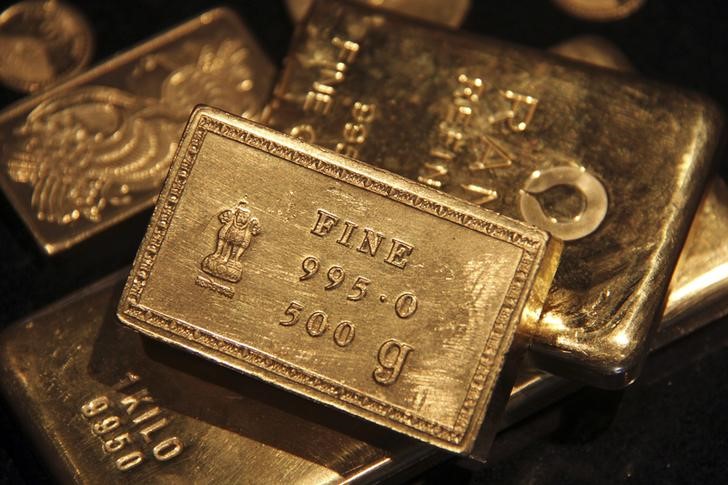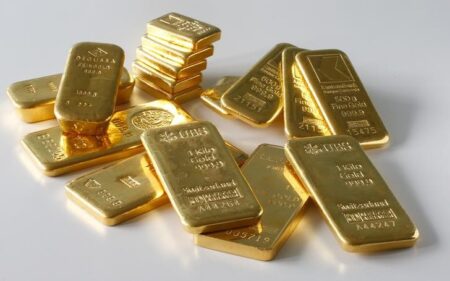Investing.com – Gold hit 6-½ month lows Wednesday as the $1,900-an-ounce support in place since early August crumbled amid a continued flow of investment money from the yellow metal towards the dollar and Treasury yields.
Gold’s most-active futures contract on New York’s Comex, , settled at $1,890.90 an ounce, down $28.90, or 1.5%. The prior low for December gold was 1,875.70, registered on March 13.
The , which is more closely watched by some traders than futures, was at $1,875.14 by 14:32 ET (18:32 GMT), down $25.52, or 1.3%. That was the lowest spot gold had gotten to since March 10, when it plumbed $1,870.28.
“King Dollar will be hard to dethrone,” said Ed Moya, analyst at online trading platform OANDA. “The U.S. dollar is rallying as Treasury yields continue to gain and on expectations [that] the U.S. growth exceptionalism story is not ready to go away.”
The dollar rallied as the euro plunged after the eurozone posted abysmal money supply data that showed a record drop in the amount of money in circulation as banks refrained from lending and depositors kept money in savings.
Over in the United States, orders for long-lasting or rose a stronger-than-expected 0.2% in August, though the increase stemmed from higher defense spending as Washington sought to replenish politically-sensitive military hardware sent to Ukraine.
In a more positive sign, the so-called jumped 0.9%. That figure omits defense and transportation and is a proxy for broader business investment.
But the U.S. growth story isn’t entirely one-way. US consumer spending, already easing on inflation concerns, could witness a sharper slowing in the final three months of the year as labor market and wage growth cool as well, Fitch Ratings said in an economic outlook published Wednesday. It forecast real spending to slow to an annualized rate of 1.2% in 4Q23 and contract by 0.8% in 1Q24 and 3% in 2Q24.
Fitch’s outlook was published a day after The Conference Board, a group that measures US consumer trends, said consumer confidence tumbled for a second month in a row in September, nearing recession levels, as Americans continued to cut spending amid rising inflation.
“Given the current interest rate environment it is clear that capital spending intentions are going to soften going forward,” Moya of OANDA said. “Until the economic data shows clear weakening labor market trends alongside earnings fears, U.S. rates will stay high and are going to continue to support a stronger dollar.”
‘King Dollar’, Treasury yields on virtually unstoppable rally
The got to highs not visited since November 2022. A stronger dollar typically discourages those holding other currencies from buying dollar-denominated commodities, including gold.
Yields, benchmarked to the , shot to fresh 16-year highs on Tuesday, reaching peaks not seen since July 2007.
The two alternatives to gold surged since the Federal Reserve last week projected another quarter-percentage point rate increase by the year-end, despite leaving rates unchanged for September at a policy meeting on Wednesday.
Fed Chair Powell told a news conference last week that energy-driven inflation was one of the central bank’s bigger concerns. Oil prices hit 10-month highs on Wednesday, with nearing $94 per barrel.
“We are prepared to raise rates further, if appropriate,” Powell said. “The fact that we decided to maintain the policy rate at this meeting doesn’t mean we have decided that we have or have not at this time reached that stance of monetary policy that we are seeking.”
The Fed had raised interest rates 11 times between February 2022 and July 2023, adding a total of 5.25 percentage points to a prior base rate of just 0.25%.
Economists fear that the Fed’s renewed hawkish stance will dampen global growth though many also agree that a lid has to be put on oil prices if the Fed is to achieve its annual inflation target of 2%.
(Ambar Warrick contributed to this item)
Read the full article here












